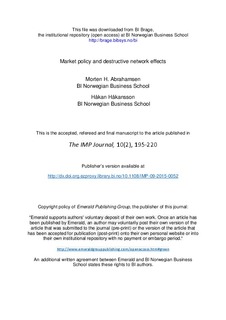Market policy and destructive network effects
Journal article, Peer reviewed
Date
2016Metadata
Show full item recordCollections
- Scientific articles [2173]
Abstract
This paper analyses how different policy perspectives or logics regarding industry organising affect network interaction, with particular focus on how the availability of resources is organised To examine this we compare two cases from the Norwegian seafood industry: In the pelagic industry, the main resource (mackerel) is caught at sea by fishing vessels and trade is restricted by an auction system, whereas in the salmon industry, the main resource (farmed salmon) is an industrial product produced at fish farms and there are no such restrictions.
Our results indicate that conditions under which resources are available to a network have strong effects on connected relationships: In the pelagic industry, interaction in the network becomes supplier-directed in an attempt to reduce the uncertainty created by unstable and restricted availability of resources, whereas in the salmon industry the interaction becomes customer-directed as resource availability is stable and predictable. Here the actors can broaden the scope of interaction and they can direct their efforts to solve their customers’ problems, whereas this is difficult in the pelagic industry. We conclude that policy considerations play a major role in these effects. If the resource (fish) is seen as a commodity and the interaction is seen as a market mechanism, the policies designed to facilitate the exchange of resources will be beneficial for the actors directly involved, but may have unintended negative consequences for indirect relationships. For policy makers this implies that whenever developing an industrial policy there are strong reasons to look beyond the single transaction in order to create policies that are effective and/or beneficial for all involved and connected parties.
Description
This is the accepted, refereed and final manuscript to the article
